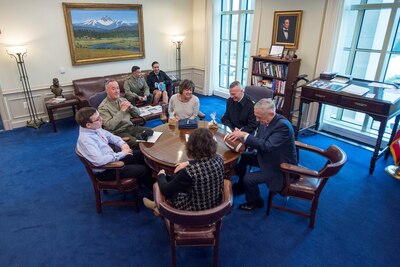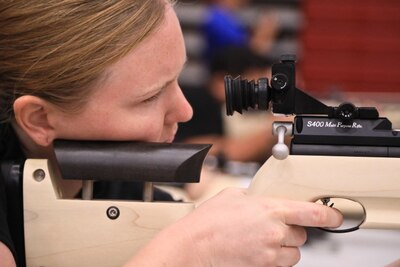By Air Force Tech. Sgt. Chuck Broadway DoD News, Defense
Media Activity
WASHINGTON, April 2, 2018 — A North Carolina teenager had
his wish come true today with a visit to the Pentagon that included meeting
several Defense Department leaders.
In addition to walking the Pentagon’s halls during a visit
made possible by the Make-A-Wish Foundation, Cooper Smith, 16, met with Defense
Secretary James N. Mattis; Air Force Secretary Heather Wilson; Marine Corps
Gen. Joe Dunford, the chairman of the Joint Chiefs of Staff; and senior
enlisted advisors from all branches of the military.
Smith lives with neurofibromatosis type 1, a multisystem
genetic disorder characterized by changes in skin coloring and the growth of
tumors along nerves in the skin, brain and other parts of the body.
“The people I met were fantastic and seemed to really care
about the country,” Smith said. “I wanted to see how the Pentagon works and see
how each single factor plays into each other. I thought things would be more
independent, but I saw how each [service branch] relies on each other.”
Admiration for Service Members
His admiration for the military comes from his recognition
of the service and sacrifice of the nation’s men and women in uniform, he said.
Though he cannot serve as a military member, Smith said, he
feels it is his civic duty to make his community a better place. He volunteers
at several organizations in North Carolina, including the Ronald McDonald House
and Brenner’s Children’s Hospital, and he initiated a project that secures used
books, toys, and games for a school in near Winston-Salem, North Carolina, with
a high percentage of students from low-income families. He donated bags of
books and games to begin the initiative, and so far, the project has
accumulated several truckloads of donations to help the school.
Smith’s family said they feel obligated to give back to
community members in need, as they have received a tremendous amount of help in
getting through difficult times and allowing Cooper to experience great
moments.
His mother, Cindy Smith, is an Army veteran. She said her
family gained a new appreciation for what the Defense Department does.
“We had such a limited idea of the sheer enormity of the
decisions that are made every day that impact our entire country,” she said.
“We appreciate and respect what people do here. It has been unbelievable.”










